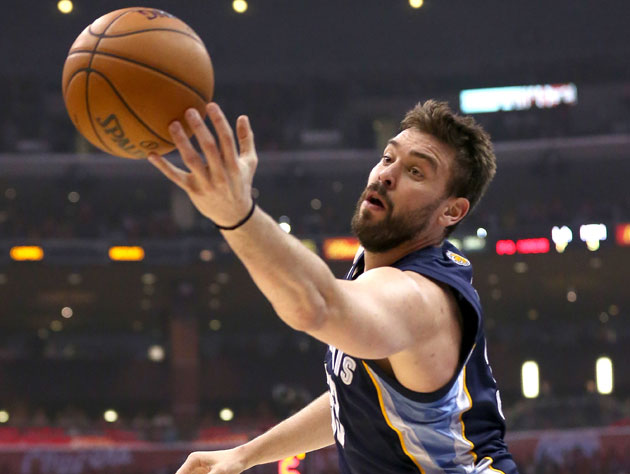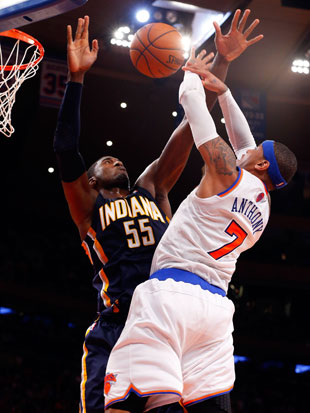
Marc Gasol has won the NBA’s Defensive Player of the Year award, in a triumph for both the Memphis Grizzlies center, and voters that wanted to get this one right. Like Tyson Chandler’s DPoY award win from 2011-12, the top vote-getter did not rank amongst the league leaders in blocks and rebounds, as his impact was mostly felt from possession to possession as Gasol consistently chased all manner of guards and forwards, while dominating his man in the pivot most nights out.
Unlike Chandler, though, Gasol does not play in a huge market. Chandler had an NBA title in 2011 and heaps of both Dallas Maverick and New York Knick games on national TV to aid in his exposure as beast without a statistical bent. Gasol’s award mainly speaks to a culture of voters that just could not believe how fantastic Marc looked on that end while chasing off opponents from the three-point line on down. Usually pitched to their eyes through the NBA’s League Pass package, or the various video and statistical sites that can break down a player’s play in terms that don’t show up in the typical box score.
To be sure, Gasol’s Grizzlies have been in the playoffs for three straight seasons, putting Gasol on national TV in the postseason 20 times before his team suited up against the Los Angeles Clippers earlier this week. And both ESPN and TNT aren’t averse to putting the Grizzlies on air, thankfully. Still, considering the various misses from the voting community from NBA types that don’t have the time (or, worse, just don’t care about going beyond the league leaders) over the last few years, this is a huge step forward.
It’s been bandied about that Gasol’s win is a victory for the advanced statistical community. The same community that was able to see past Chandler’s block and rebound totals last year and vote him in as Defensive Player of the Year, when the NBA’s (assistant) coaches (who always skim this award) didn’t even bother to recognize Chandler’s behemoth 2011-12 season with a spot on the All-Defensive team. And while Gasol’s off/on court statistics were sublime in 2012-13, even the most ardent practitioners of advanced basketball statistics will admit that tallying individual defense with gobs of numbers is still in its nascent stages.
So how about that? The hardest thing to quantify statistically is somehow leading the surge when it comes to handing awards to those that deserve them the most. In the end, it comes down to what us who pay extra attention to advanced stats have been telling the dismissive naysayers (“just watch the game, man”) for years: It’s about scouting. It’s always been about scouting. We’ve never preached anything else. We just like some numbers to go along with the games we love to watch, man.
It is true there is significant and increasing NBA groupthink, especially as journalists and NBA fans while the day away on Twitter, interacting in real time in full view of the group while sharing links and column and the latest takes. Groupthink is also goodthink for a reason, because sometimes the most popular things are just that because they should be. Cheeseburgers and beer are good, Jon Hamm and Christina Hendricks are easy on the eyes, Tupac was awesome, and Biggie may have been even better.
It’s probably because of that groupthink that Gasol (who was the right pick, make no mistake) wins this award, because how else could you explain the 10th place ranking of Indiana Pacer center Roy Hibbert?
Hibbert leads the NBA’s best defensive team – and it’s “the best” by a few trips around the Indianapolis Motor Speedway’s track. Without the presence of a lights-out defender in Tony Allen to dominate at times (Paul George is fantastic, but not at Allen’s level), Hibbert blends most of the same attributes that Gasol comes through with to great acclaim. He sags and covers both the potential penetrator and potential pass receiver with ease, he chases opponents out of the lane, he’ll block enough shots per game and rebound well enough to keep his Pacers respectable, but by and large Hibbert’s role is to alter shots and change a team’s offensive playbook.
I’m not stumping for Hibbert, who played fewer minutes than Gasol this year and was clearly a good second choice amongst the center ranks. Tenth place, though, is ridiculous. Especially when you consider just how alike the Pacer and Grizzlies franchise are in terms of big market exposure, and status amongst the second tiers of their respective conferences.
 Chicago Bulls whirlwind center Joakim Noah may have given Gasol a fight for the award, but despite playing massive minutes to start the season, he still turned in over 300 fewer minutes than Gasol this year, and his effectiveness in his games from February onward dwindled (from the realm of “wow, look at this guy,” to, “geez, this limping guy is still pretty good) while Gasol remained stout. Larry Sanders, even though he played fewer than 28 minutes a night, was a worthy candidate for the Milwaukee Bucks. As was Miami Heat superstar LeBron James (who came in second, and finished with the second largest amount of first place vote) was good for consideration, if we only count his post-Christmas output on that end.
Chicago Bulls whirlwind center Joakim Noah may have given Gasol a fight for the award, but despite playing massive minutes to start the season, he still turned in over 300 fewer minutes than Gasol this year, and his effectiveness in his games from February onward dwindled (from the realm of “wow, look at this guy,” to, “geez, this limping guy is still pretty good) while Gasol remained stout. Larry Sanders, even though he played fewer than 28 minutes a night, was a worthy candidate for the Milwaukee Bucks. As was Miami Heat superstar LeBron James (who came in second, and finished with the second largest amount of first place vote) was good for consideration, if we only count his post-Christmas output on that end.
Oklahoma City’s Serge Ibaka’s league-leading blocks per game numbers went down to “only” three per contest this season, but it was obvious from the outset of the season that he was trying to curb his roaming instincts and work more as a team defender. His Defensive Win Shares fell a bit, but OKC’s defense improved significantly in 2012-13 – a major credit to the ever-improving Thunder forward.
Former winners Tyson Chandler and Dwight Howard did well to work through injury, but both struggled this season and fished 13th and 14th respectively. Howard did receive one first place vote, and his reputation clearly hampered him in this area, because there’s no way that he was the NBA’s 14th-best defender in 2012-13.
Marc Gasol is hardly obscure. He is the brother of a two-time NBA champion, he’s a decorated international player, he’s been the starting pivot for a team that has made three-straight playoff runs, and the rumbles about him working as the NBA’s potential Defensive Player of the Year have been in place since mid-December.
It is still important to consider and applaud what an award like this means, for someone like Marc Gasol.
More than any other time in NBA history, big men are asked to dissuade all positions from scoring, while being told to cover all angles from the three-point line on down to the rim. It’s true that the ranks of scoring centers has dwindled over the last 30 years, but no longer can centers stay glued to their man just feet from the hoop, while switching over to give the occasional shot block and defensive rebound. Now, more than ever centers are asked to disrupt and defend like an all-around Destroyer of Worlds. A 7-foot Shiva, acting like a 7-foot Scottie Pippen.
That’s not easy on a big man. And it’s even harder on voters, while they watch plays away from the ball, or attempt to argue away why perhaps the most dominant player they saw on a particular night only ended his evening with eight rebounds, a block, and zero steals.
Good for Gasol, and good for these voters in getting it right.
***
Dan Devine? He always gets it right. This is why he’ll be dropping a few thoughts of his own on Gasol’s win. Take ‘er away, chum:
***
Marc Gasol's Grizzlies finished second in the NBA in defensive efficiency, which measures how many points a team allows per 100 possessions, according to NBA.com's stat tool. Only the Indiana Pacers proved stingier over the course of the regular season. Their center, Roy Hibbert, was also a legitimate DPOY candidate, finishing third in the league in block percentage (the share of opponents' shots you reject while on the court) behind Serge Ibaka of the Oklahoma City Thunder and the Milwaukee Bucks' Larry Sanders, and dominating the front of the rim -- Pacers opponents shot just 50.4 percent inside the restricted area when Hibbert was in the game this season, compared with 57.2 percent when he was out of the game. Hibbert also turned in a better individual defensive rating -- an estimate of how many points per 100 possessions an individual player allowed -- than Gasol.
But when Hibbert left the floor, the Pacers D didn't fall apart -- in fact, the drop-off (from 95.6 points allowed per 100 possessions with him in to 98-per-100 when him sitting) still would've left Indy as the third-best defense in the league over the course of the regular season. This is due, in part, to the presence of stalwart teammates like Most Improved Player Paul George, who finished eighth in DPOY balloting and would have been his own coach's pick for the award over Hibbert, for whatever that's worth.
With Gasol, however, the difference is much more stark -- Memphis allowed 95.4 points per 100 possessions with him on the floor and 102.2 points-per-100 with him sitting. That's the difference between being the best defense in the NBA (better even than the Pacers with Hibbert) and being 12th, a tick ahead of the good-but-not-great Milwaukee Bucks' D. That's a big difference, and while Gasol's individual counting stats (defensive rebounds, blocks, steals, etc.) won't wow you, the impact he has on Memphis' team defense as a whole -- the communication, the play recognition, the ability to direct a teammate to take a step here or make a switch there to be able to eliminate a potentially threatening action two passes away, etc. -- is simply massive, as multiple smart people have broken down in the recent past.
Teammate Tony Allen, who finished fifth in DPOY voting and is also a sensational choice, is a better on-ball defender than Gasol, and perhaps the best wing defender in the league (though if you wanted to tap Andre Iguodala for that honor, I wouldn't fight you in the street). But he doesn't serve as the nerve center of his team's entire defensive attack in the same way that Gasol does, which is why Gasol's the more valuable defender to Memphis. And while fellow worthy big men Tim Duncan and Joakim Noah all do serve as that organizing back-line principle, Gasol played 370 more minutes (and 14 more games) than Noah and 718 more minutes (and 11 more games) than Duncan. Being there counts, and nobody's presence on the defensive end of the floor counted more than Gasol's this year.
No comments:
Post a Comment